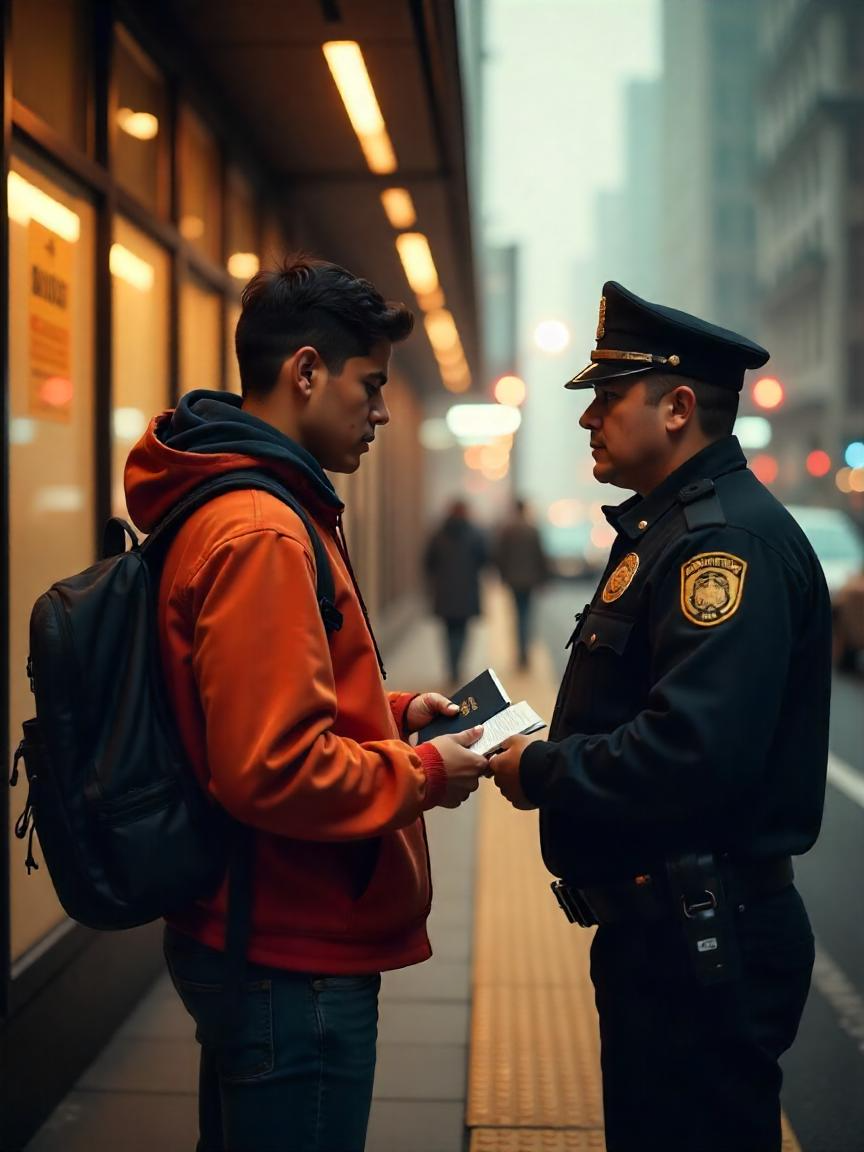
What To Do If The Police Ask About Your Immigration Status in Houston, Texas
Having an encounter with the police can be a nerve-wracking experience for both immigrants and non-immigrants. If you’re an immigrant or have unresolved immigration issues, it can make the situation even more complex. By knowing your rights and understanding how to handle these encounters, you can better protect yourself and ensure a safer experience. In this blog, we will discuss what to do if the police ask about your immigration status in Houston, Texas.
Tensions can run high when dealing with police officers, and the way you respond is very important. Neither you nor the officer knows how the encounter might end. Depending on your immigration status, the outcome could have serious consequences. Therefore, it is crucial to remain calm and think carefully before responding, in order to avoid any negative impact on your immigration process.
U.S. immigration law is enforced by federal agencies such as Immigration and Customs Enforcement (ICE), United States Citizenship and Immigration Services (USCIS), and Customs and Border Protection (CBP). State and local police officers generally do not have the authority to enforce federal immigration laws; it is not part of their official duties.
However, in 2017, a law known as Senate Bill 4 (SB4) was passed, granting Texas law enforcement officers the authority to inquire about an individual’s immigration status during lawful detentions or arrests. Texas is one of the few states to have implemented this law.
Read This: How To Apply For USA Citizenship in Houston Texas

Here Are What To Do If The Police Ask About Your Immigration Status in Houston, Texas
1. Know and Understand Your Rights
The first step in handling a police encounter is to know and understand your rights. Regardless of your immigration status, certain fundamental rights are protected under the U.S. Constitution. These include:
- The right to remain silent: Protected by the Fifth Amendment, this right allows you to refuse to answer questions about your birthplace, citizenship status, place of residence, or any other information that could incriminate you.
- The right to refuse consent to a search: The police may only search your home or property if they have a valid search warrant signed by a judge. If they do not, you can politely ask them to leave.
- The right to an attorney: If you face any legal issues as an undocumented immigrant, you have the right to be represented by an attorney.
You are not obligated to disclose your immigration status unless you are being detained by immigration authorities.
2. Be Calm and Polite
It is important to remain calm and respectful during any interaction with the police. Cooperate without volunteering unnecessary information. Avoid arguing, making sudden movements, or acting suspiciously. Reaching for items without permission may be perceived as threatening behavior and could escalate the situation.
Remember, being polite does not mean surrendering your rights. You can assert your rights respectfully.
3. Be Very Observant and Watchful
In some cases, police officers may act outside the scope of the law. If you are arrested or detained without just cause, it’s essential to gather as much evidence as possible. Be proactive in noting the officers’ names, badge numbers, the time, and location of the encounter.
If safe to do so, take photos, record videos, or make audio recordings of the interaction. This documentation could support your case if you need to file a complaint or seek legal assistance later.
4. Don’t Lie – Be Truthful
If you’re an undocumented immigrant, never provide false information to law enforcement officers. Doing so can have serious legal consequences. If you prefer not to answer a question, simply state, “I choose to remain silent.”
Only immigration officers have the legal authority to demand your immigration documents. If requested and you have them on you, present them.
If you do choose to answer questions, be truthful. Providing false information or misrepresenting yourself can lead to criminal charges and negatively impact your immigration process. Misrepresenting yourself as a U.S. citizen, for example, can make you permanently ineligible for citizenship and result in removal (deportation) proceedings.
5. Present Your Documents
When stopped by the police, you may be asked for identification. If you are an immigrant aged 18 or older and have legal status, you should always carry your immigration papers—this may include your passport, green card, Adjustment of Status documents, or any document with your Alien Registration Number.
If you are a U.S. citizen, you do not need to carry immigration documents. A state-issued driver’s license will usually suffice as proof of legal residence.
6. Know Your Local Policies
Local enforcement of immigration laws can vary. It’s important to familiarize yourself with the local policies in your area. Know the laws regarding traffic stops, local cooperation with ICE, and other relevant immigration practices. Understanding your community’s specific policies can help you navigate encounters with law enforcement more confidently.
When to Exercise Your Right to an Attorney
If a police officer searches your property without a warrant, questions your immigration status unlawfully, or detains you without cause, you should request to speak to an attorney immediately.
Having legal representation ensures your rights are protected, prevents misuse of authority, and provides access to accurate legal guidance. A competent immigration attorney can speak on your behalf, advocate for your case, and work to protect your stay in the U.S.
Even if you cannot afford an attorney, you can request that one be appointed at no cost. U.S. law ensures everyone has fair access to legal representation, regardless of immigration status.
You should seek legal counsel if:
- You are arrested as an immigrant and it may jeopardize your stay in the U.S.
- You chose to remain silent when asked about your immigration status.
- Your rights were violated by the police during the encounter.
- You are facing deportation and your case has been referred to an immigration judge.
Note:
If you were assigned an attorney and you are not confident in their ability to represent you, you are entitled to seek a different attorney. If a previous attorney’s mistakes negatively impacted your case, you may be eligible to resubmit your application with the help of competent legal counsel.
@legallyuzo Don't do these things if you want to be a US citizen. 1. rovide false information or commit fraud during the immigration process 2. Failure to pay taxes or failure to file income tax 3. Sectons criminal convictions, especial felonies, can impact your Hability for citizenship Visit: https://www.mokololaw.com/practice/immigration-law/
♬ original sound – Legallyuzo
Lastly On What To Do If The Police Ask About Your Immigration Status in Houston, Texas
Encounters with law enforcement can be stressful, especially when questions about your immigration status are involved. It is wise to consult with an immigration attorney to ensure you receive accurate legal advice tailored to your specific situation. Having the right legal representative by your side can make all the difference between staying in the U.S. or facing deportation.
Find Immigration Experts to Protect Your Rights
Contact the Skilled Immigration Lawyers at Mokolo Law Firm.
Our experienced immigration attorneys can speak on your behalf, help you avoid costly mistakes, and protect you from deportation. We understand how quickly things can escalate for undocumented immigrants during law enforcement encounters. Let us guide and represent you through the legal process and fight for the best outcome possible.
Latest Posts
My Spouse Uses Cash to Hide Assets: What to Do in a Texas Divorce
Divorce in Texas requires full financial transparency. Both spouses are legally required to disclose all assets and debts. But what happens when you...
How to Build the Right Divorce Team in Texas
Divorce in Texas is more than filing paperwork. It can involve property division, child custody, business interests, retirement accounts, real estate, and...


